- Home
- Philip Roth
Shop Talk Page 2
Shop Talk Read online
Page 2
Levi: Rather than a question, this is a diagnosis, which I accept with thanks. I lived my camp life as rationally as I could, and I wrote If This Is a Man struggling to explain to others, and to myself, the events I had been involved in, but with no definite literary intention. My model (or, if you prefer, my style) was that of the "weekly report" commonly used in factories: it must be precise, concise, and written in a language comprehensible to everybody in the industrial hierarchy. And certainly not written in scientific jargon. By the way, I am not a scientist, nor have I ever been. I did want to become one, but war and the camp prevented me. I had to limit myself to being a technician throughout my professional life.
I agree with you about there being only "one soul ... and seamless," and once more I feel grateful to you. My statement that "two souls ... is too many" is half a joke but half hints at serious things. I worked in a factory for almost thirty years, and I must admit that there is no incompatibility between being a chemist and being a writer—in fact, there is a mutual reinforcement. But factory life, and particularly factory managing, involves many other matters, far from chemistry: hiring and firing workers; quarreling with the boss, customers, and suppliers; coping with accidents; being called to the telephone, even at night or when at a party; dealing with bureaucracy; and many more soul-destroying tasks. This whole trade is brutally incompatible with writing, which requires a fair amount of peace of mind. Consequently I felt hugely relieved when I reached retirement age and could resign, and so renounce my soul number one.
Roth: Your sequel to If This Is a Man (The Reawakening, also unfortunately retitled by one of your early American publishers) was called in Italian La tregua, "the truce." It's about your journey from Auschwitz back to Italy. There is a legendary dimension to that tortuous journey, especially to the story of your long gestation period in the Soviet Union, waiting to be repatriated. What's surprising about The Truce, which might understandably have been marked by a mood of mourning and inconsolable despair, is its exuberance. Your reconciliation with life takes place in a world that sometimes seemed to you like the primeval Chaos. Yet you are engaged by everyone, so highly entertained as well as instructed that I wonder if, despite the hunger and the cold and the fears, even despite the memories, you've ever really had a better time than during those months you call "a parenthesis of unlimited availability, a providential but unrepeatable gift of fate."
You appear to be someone who requires, above all, rootedness—in his profession, his ancestry, his region, his language—and yet when you found yourself as alone and uprooted as a man can be, you considered that condition a gift.
Levi: A friend of mine, an excellent doctor, told me many years ago: "Your remembrances of before and after are in black and white; those of Auschwitz and of your travel home are in Technicolor." He was right. Family, home, factory are good things in themselves, but they deprived me of something that I still miss: adventure. Destiny decided that I should find adventure in the awful mess of a Europe swept by war.
You are in the business, so you know how these things happen. The Truce was written fourteen years after If This Is a Man; it is a more "self-conscious" book, more methodical, more literary, the language much more profoundly elaborated. It tells the truth, but filtered truth. It was preceded by countless verbal versions. I mean, I had recounted each adventure many times, to people at widely different cultural levels (to friends mainly, and to high school boys and girls), and I had retouched it en route so as to arouse their most favorable reactions. When If This Is a Man began to achieve some success, and I began to see a future for my writing, I set out to put these adventures on paper. I aimed at having fun in writing and at amusing my prospective readers. Consequently I gave emphasis to strange, exotic, cheerful episodes—mainly to the Russians seen close up—and I relegated to the first and last pages the mood, as you put it, "of mourning and inconsolable despair."
I must remind you that the book was written around 1961; these were the years of Khrushchev, of Kennedy, of Pope John, of the first thaw and of great hopes. In Italy, for the first time, you could speak of the USSR in objective terms without being called a philo-Communist by the right wing and a disruptive reactionary by the powerful Italian Communist Party.
As for "rootedness," it is true that I have deep roots and that I had the luck of not losing them. My family was almost completely spared by the Nazi slaughter. The desk here where I write occupies, according to family legend, exactly the spot where I first saw light. When I found myself as "uprooted as a man can be," certainly I suffered, but this was far more than compensated for afterward by the fascination of adventure, by human encounters, by the sweetness of "convalescence" from the plague of Auschwitz. In its historical reality, my Russian "truce" turned to a "gift" only many years later, when I purified it by rethinking it and by writing about it.
Roth: You begin The Periodic Table by speaking of your Jewish ancestors, who arrived in Piedmont from Spain, by way of Provence, in 1500. You describe your family roots in Piedmont and Turin as "not enormous, but deep, extensive, and fantastically intertwined." You supply a brief lexicon of the jargon these Jews concocted and used primarily as a secret language from the Gentiles, an argot composed of words derived from Hebrew roots but with Piedmontese endings. To an outsider your rootedness in this Jewish world of your forebears seems not only intertwined but, in an essential way, identical with your rootedness in the region. However, in 1938, when the racial laws were introduced restricting the freedom of Italian Jews, you came to consider being Jewish an "impurity," though, as you say in The Periodic Table, "I began to be proud of being impure."
The tension between your rootedness and your impurity makes me think of something that Professor Arnaldo Momigliano wrote about the Jews of Italy, that "the Jews were less a part of Italian life than they thought they were." How much a part of Italian life do you think you are? Do you remain an impurity, "a grain of salt or mustard," or has that sense of distinctness disappeared?
Levi: I see no contradiction between "rootedness" and being (or feeling) "a grain of mustard." To feel oneself a catalyst, a spur to one's cultural environment, a something or a somebody that confers taste and sense to life, you don't need racial laws or anti-Semitism or racism in general; however, it is an advantage to belong to a (not necessarily racial) minority. In other words, it can prove useful not to be pure. If I may return to the question: don't you feel yourself, you, Philip Roth, "rooted" in your country and at the same time "a mustard grain"? In your books I perceive a sharp mustard flavor.
I think this is the meaning of your quotation from Arnaldo Momigliano. Italian Jews (but the same can be said of the Jews of many other nations) made an important contribution to their country's cultural and political life without renouncing their identity, in fact by keeping faith with their cultural tradition. To possess two traditions, as happens to Jews but not only to Jews, is a richness—for writers but not only for writers.
I feel slightly uneasy replying to your explicit question. Yes, sure, I am a part of Italian life. Several of my books are read and discussed in high schools. I receive lots of letters—intelligent, silly, senseless—of appreciation, less frequently dissenting and quarrelsome. I receive useless manuscripts by would-be writers. My "distinctness" has changed in nature: I don't feel an emarginato, ghettoized, an outlaw, anymore, as in Italy there is actually no anti-Semitism. In fact, Judaism is viewed with interest and mostly with sympathy, although with mixed feelings toward Israel.
In my own way I have remained an impurity, an anomaly, but now for reasons other than before: not especially as a Jew but as an Auschwitz survivor and as an outsider-writer, coming not from the literary or university establishment but from the industrial world.
Roth: If Not Now, When? is like nothing else of yours that I've read in English. Though pointedly drawn from actual historical events, the book is cast as a straightforward picaresque adventure tale about a small band of Jewish partisans of Russian and Polish extraction
harassing the Germans behind their Eastern frontlines. Your other books are perhaps less "imaginary" as to subject matter but strike me as more imaginative in technique. The motive behind If Not Now, When? seems more narrowly tendentious—and consequently less liberating to the writer—than the impulse that generates the autobiographical works.
I wonder if you agree with this: if in writing about the bravery of the Jews who fought back, you felt yourself doing something you ought to do, responsible to moral and political claims that don't necessarily intervene elsewhere, even when the subject is your own markedly Jewish fate.
Levi: If Not Now, When? is a book that followed an unforeseen path. The motivations that drove me to write it are manifold. Here they are, in order of importance.
I had made a sort of bet with myself: After so much plain or disguised autobiography, are you or are you not a fully fledged writer, capable of constructing a novel, shaping character, describing landscapes you have never seen? Try it!
I intended to amuse myself by writing a "Western" plot set in a landscape uncommon in Italy. I intended to amuse my readers by telling them a substantially optimistic story, a story of hope, even occasionally cheerful, although projected onto a background of massacre.
I wished to assault a commonplace still prevailing in Italy: a Jew is a mild person, a scholar (religious or profane), unwarlike, humiliated, who tolerated centuries of persecution without ever fighting back. It seemed to me a duty to pay homage to those Jews who, in desperate conditions, found the courage and the skill to resist.
I cherished the ambition to be the first (perhaps the only) Italian writer to describe the Yiddish world. I intended to "exploit" my popularity in my country in order to impose upon my readers a book centered on the Ashkenazi civilization, history, language, and frame of mind, all of which are virtually unknown in Italy, except by some sophisticated readers of Joseph Roth, Bellow, Singer, Malamud, Potok, and of course you.
Personally, I am satisfied with this book, mainly because I had good fun planning and writing it. For the first and only time in my life as a writer, I had the impression (almost a hallucination) that my characters were alive, around me, behind my back, suggesting spontaneously their feats and their dialogues. The year I spent writing was a happy one, and so, whatever the result, for me this was a liberating book.
Roth: Let's talk about the paint factory. In our time many writers have worked as teachers, some as journalists, and most writers over fifty, in the East or the West, have been employed, for a while at least, as somebody or other's soldier. There is an impressive list of writers who have simultaneously practiced medicine and written books and of others who have been clergymen. T. S. Eliot was a publisher, and as everyone knows Wallace Stevens and Franz Kafka worked for large insurance companies. To my knowledge, only two writers of importance have been managers of paint factories: you in Turin, Italy, and Sherwood Anderson in Elyria, Ohio. Anderson had to leave the paint factory (and his family) to become a writer; you seem to have become the writer you are by staying and pursuing your career there. I wonder if you think of yourself as actually more fortunate—even better equipped to write—than those of us who are without a paint factory and all that's implied by that kind of connection.
Levi: As I have already said, I entered the paint industry by chance, but I never had very much to do with the general run of paints, varnishes, and lacquers. Our company, immediately after it began, specialized in the production of wire enamels, insulating coatings for copper electrical conductors. At the peak of my career, I numbered among the thirty or forty specialists in the world in this branch. The animals hanging here on the wall are made out of scrap enameled wire.
Honestly, I knew nothing of Sherwood Anderson till you spoke of him. No, it would never have occurred to me to quit family and factory for full-time writing, as he did. I'd have feared the jump into the dark, and I would have lost any right to a retirement allowance.
However, to your list of writer-paint manufacturers I must add a third name, Italo Svevo, a converted Jew of Trieste, the author of The Confessions of Zeno, who lived from 1861 to 1928. For a long time Svevo was the commercial manager of a paint company in Trieste, the Società Venziani, that belonged to his father-in-law and that dissolved a few years ago. Until 1918 Trieste belonged to Austria, and this company was famous because it supplied the Austrian navy with an excellent antifouling paint, preventing shellfish incrustation, for the keels of warships. After 1918 Trieste became Italian, and the paint was delivered to the Italian and British navies. To be able to deal with the Admiralty, Svevo took lessons in English from James Joyce, at the time a teacher in Trieste. They became friends and Joyce assisted Svevo in finding a publisher for his works. The trade name of the antifouling paint was Moravia. That it is the same as the nom de plume of the novelist is not fortuitous: both the Trieste entrepreneur and the Roman writer derived it from the family name of a mutual relative on the mother's side. Forgive me this hardly pertinent gossip.
No, as I've hinted already, I have no regrets. I don't believe I have wasted my time in managing a factory. My factory militanza—my compulsory and honorable service there—kept me in touch with the world of real things.
Aharon Appelfeld
[1988]
Aharon Appelfeld lives a few miles west of Jerusalem in a mazelike conglomeration of attractive stone dwellings next to an "absorption center," where immigrants are temporarily housed, schooled, and prepared for life in their new society. The arduous journey that landed Appelfeld on the beaches of Tel Aviv in 1946, at the age of fourteen, seems to have fostered an unappeasable fascination with all uprooted souls, and at the local grocery where he and the absorption center's residents do their shopping, he will often initiate an impromptu conversation with an Ethiopian, or a Russian, or a Rumanian Jew still dressed for the climate of a country to which he or she will never return.
The living room of the two-story apartment is simply furnished: some comfortable chairs, books in three languages on the shelves, and on the walls impressive adolescent drawings by the Appelfelds' son Meir, who is now twenty-one and, since finishing his military duty, has been studying art in London. Yitzak, eighteen, recently completed high school and is in the first of his three years of compulsory army service. Still at home is twelve-year-old Batya, a clever girl with the dark hair and blue eyes of her Argentinean Jewish mother, Appelfeld's youthful, good-natured wife, Judith. The Appelfelds appear to have created as calm and harmonious a household as any child could hope to grow up in. During the four years that Aharon and I have been friends, I don't think I've ever visited him at home in Mevasseret Zion without remembering that his own childhood—as an escapee from a Nazi work camp, on his own in the primitive wilds of the Ukraine—provides the grimmest possible antithesis to this domestic ideal.
A portrait photograph that I've seen of Aharon Appelfeld, an antique-looking picture taken in Chernovtsy, Bukovina, in 1938, when Aharon was six—a picture brought to Palestine by surviving relatives—shows a delicately refined bourgeois child seated alertly on a hobbyhorse and wearing a beautiful sailor suit. You cannot imagine this child, only twenty-four months on, confronting the exigencies of surviving for years as a hunted and parentless little boy in the woods. The keen intelligence is certainly there, but where is the robust cunning, the feral instinct, the biological tenacity it took to endure that terrifying adventure?
As much is secreted away in that child as in the writer he's become. At fifty-five, Aharon is a small, bespectacled, compact man with a perfectly round face and a perfectly bald head and the playfully thoughtful air of a benign wizard. He'd have no trouble passing for a magician who entertains children at birthday parties by pulling doves out of a hat—it's easier to associate his gently affable and kindly appearance with that job than with the responsibility by which he seems inescapably propelled: responding, in a string of elusively portentous stories, to the disappearance from Europe—while he was outwitting peasants and foraging in the forests—of j
ust about all the continent's Jews, his parents among them.
His literary subject is not the Holocaust, however, or even Jewish persecution. Nor, to my mind, is what he writes Jewish fiction or, for that matter, Israeli fiction. Nor, since he is a Jewish citizen of a Jewish state composed largely of immigrants, is his an exile's fiction. And, despite the European locale of many of his novels and the echoes of Kafka, these books written in the Hebrew language aren't European fiction. Indeed, all that Appelfeld is not adds up to what he is, and that is a dislocated writer, a deported writer, a dispossessed and uprooted writer. Appelfeld is a displaced writer of displaced fiction, who has made of displacement and disorientation a subject uniquely his own. His sensibility—marked almost at birth by the solitary wanderings of a little bourgeois boy through an ominous nowhere—appears to have spontaneously generated a style of sparing specificity, of out-of-time progression and thwarted narrative drives, that is an uncanny prose realization of the displaced mentality. As unique as the subject is a voice that originates in a wounded consciousness pitched somewhere between amnesia and memory and that situates the fiction it narrates midway between parable and history.
Since we met in 1984, Aharon and I have talked together at great length, usually while walking through the streets of London, New York, and Jerusalem. I've known him over these years as an oracular anecdotalist and folkloristic enchanter, as a wittily laconic kibitzer and an obsessive dissector of Jewish states of mind—of Jewish aversions, delusions, remembrances, and manias. Yet as is often the case in friendships between writers, during these peripatetic conversations we had never really touched on each other's work—that is, not until last month, when I traveled to Jerusalem to discuss with him the six of his fifteen published books that are now in English translation.

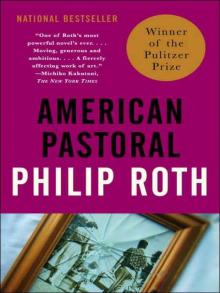 American Pastoral
American Pastoral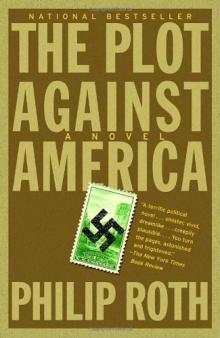 The plot against America
The plot against America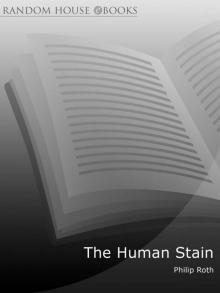 The Human Stain
The Human Stain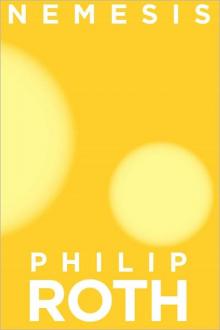 Nemesis n-4
Nemesis n-4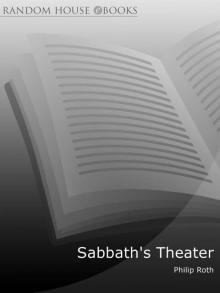 Sabbath’s Theater
Sabbath’s Theater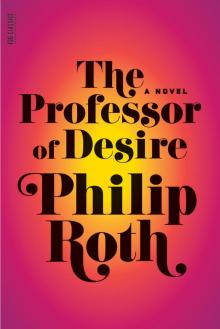 The Professor of Desire
The Professor of Desire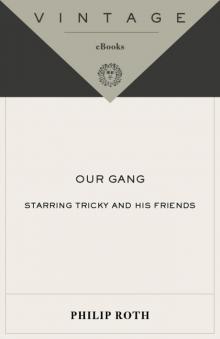 Our Gang
Our Gang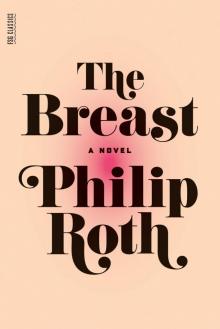 The Breast
The Breast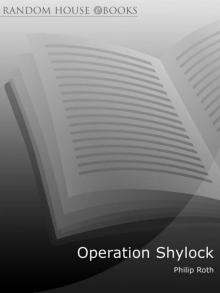 Operation Shylock
Operation Shylock The Dying Animal
The Dying Animal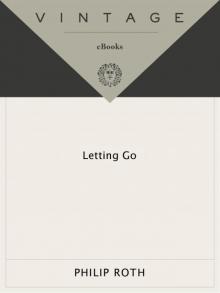 Letting Go
Letting Go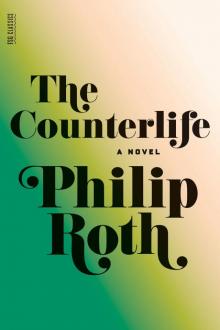 The Counterlife
The Counterlife Everyman
Everyman Nemesis
Nemesis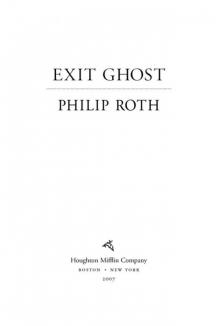 Exit Ghost
Exit Ghost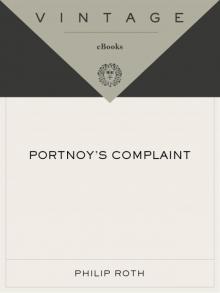 Portnoy's Complaint
Portnoy's Complaint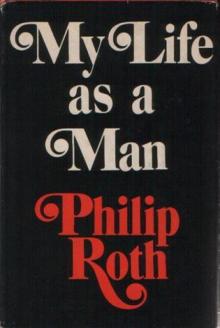 My Life as a Man
My Life as a Man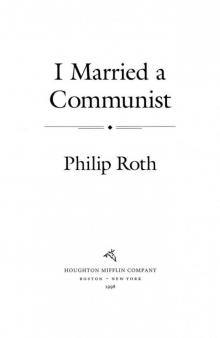 I Married a Communist
I Married a Communist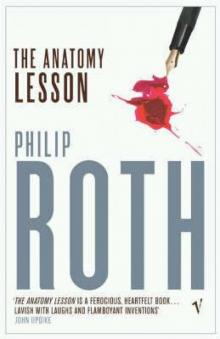 The Anatomy Lesson
The Anatomy Lesson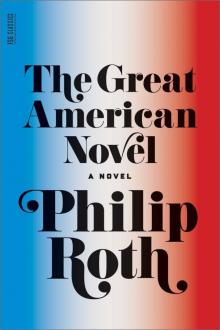 The Great American Novel
The Great American Novel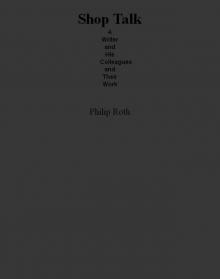 Shop Talk
Shop Talk The Humbling
The Humbling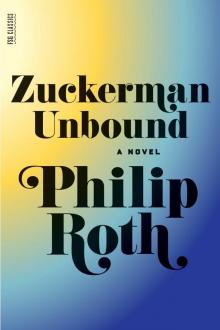 Zuckerman Unbound
Zuckerman Unbound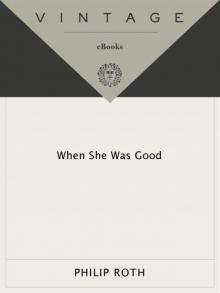 When She Was Good
When She Was Good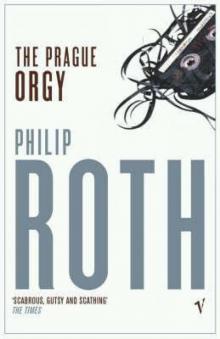 The Prague Orgy
The Prague Orgy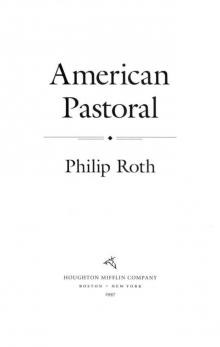 American Pastoral (Nathan Zuckerman)
American Pastoral (Nathan Zuckerman) Goodbye, Columbus
Goodbye, Columbus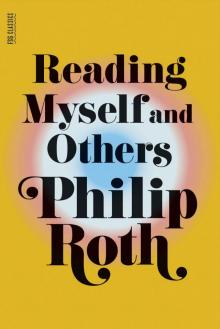 Reading Myself and Others
Reading Myself and Others